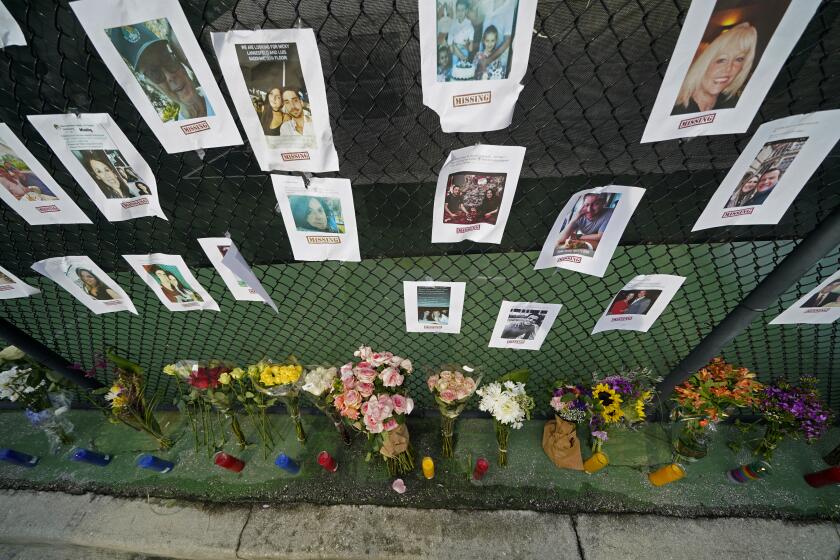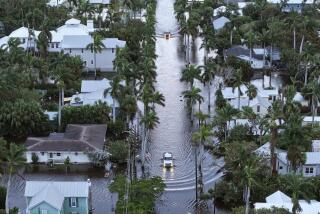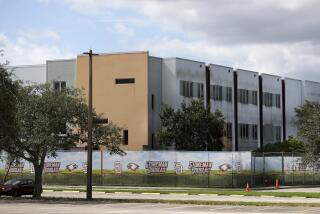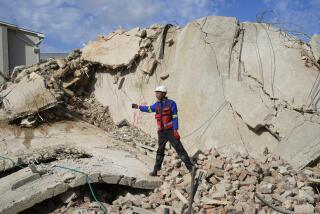Crews spend fifth day atop collapsed Miami-area condo as death toll rises to 11
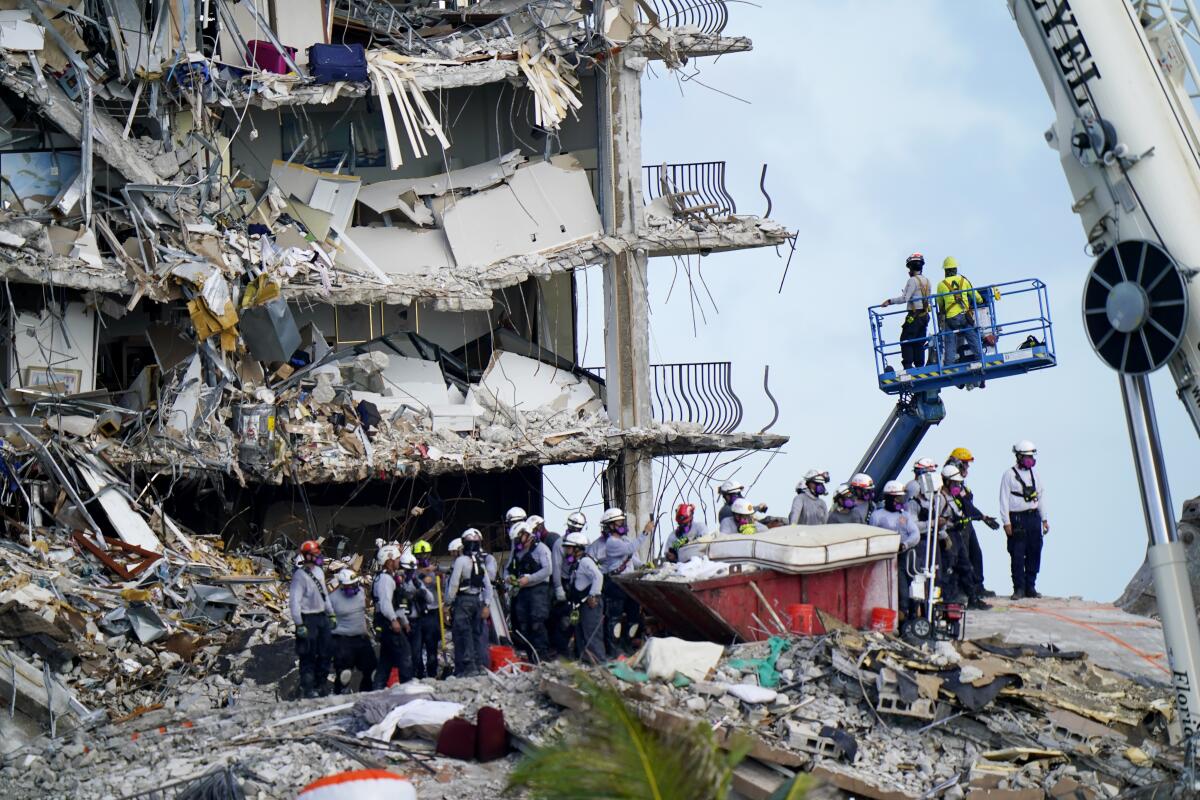
- Share via
SURFSIDE, Fla. — Rescuers searching for a fifth day for survivors of a Florida condo building collapse used bucket brigades and heavy machinery Monday as they worked atop a precarious mound of pulverized concrete, twisted steel and the remnants of dozens of households.
Authorities said the efforts are still a search-and-rescue operation, but no one has been found alive since hours after the collapse Thursday. Two more bodies were recovered Monday, bringing the confirmed death toll to 11. More than 150 others are still missing in the community of Surfside, just outside Miami.
The pancake collapse of the 12-story building left layer upon layer of intertwined debris, frustrating efforts to reach anyone who may have survived in a pocket of space.
“Every time there’s an action, there’s a reaction,” Miami-Dade Assistant Fire Chief Raide Jadallah said during a news conference. “It’s not an issue of we could just attach a couple of cords to a concrete boulder and lift it and call it a day.” Some of the concrete pieces are smaller, the size of basketballs or baseballs.
Underscoring the dangerous nature of the work, he noted that families who rode buses to visit the site Sunday witnessed a rescuer tumble 25 feet down the pile. Workers and victims must both be considered, he said.
“It’s going to take time,” he said. “It’s not going to happen overnight. It’s a 12-story building.”
Relatives continued their visits on Monday. From outside a neighboring building, more than two dozen family members watched teams of searchers excavate the building site. Some held onto each other for support. Others hugged and prayed. Some people took photos.
The intense effort includes firefighters, sniffer dogs and search experts using radar and sonar devices.
The people inside Champlain Towers South reflected the Miami area’s mix of South American immigrants and tourists, Orthodox Jews and sun-chasing retirees.
Early Monday, a crane lifted a large slab of concrete from the debris pile, enabling about 30 rescuers in hard hats to move in and carry smaller pieces of debris into red buckets, which are emptied into a larger bin for a crane to remove. The work has been complicated by intermittent rain showers, but the fires that hampered the initial search have been extinguished.
Jimmy Patronis, Florida’s chief financial officer and state fire marshal, said it was the largest deployment of such resources in Florida history that was not due to a hurricane. He said the same number of people were on the ground in Surfside as during Hurricane Michael, a devastating Category 5 hurricane that hit 12 counties in 2018.
“They’re working around the clock,” Patronis said. “They’re working 12 hours at a time, midnight to noon to midnight.”
Andy Alvarez, a deputy incident commander with Miami-Dade Fire Rescue, told ABC’s “Good Morning America” that rescuers have been able to find some voids inside the wreckage, mostly in the basement and the parking garage.
“We have over 80 rescuers at a time that are breaching the walls that collapsed, in a frantic effort to try to rescue those that are still viable and to get to those voids that we typically know exist in these buildings,” Alvarez said.
“We have been able to tunnel through the building,” Alvarez added. “This is a frantic search to seek that hope, that miracle, to see who we can bring out of this building alive.”
Others who have seen the wreckage up close were daunted by the task ahead.
Alfredo Lopez, who lived with his wife in a sixth-floor corner apartment and narrowly escaped, said he finds it hard to believe anyone is alive in the rubble.
“If you saw what I saw: nothingness. And then, you go over there and you see, like, all the rubble. How can somebody survive that?” Lopez told the Associated Press.
Authorities on Monday insisted they are not losing hope.
“We’re going to continue and work ceaselessly to exhaust every possible option in our search,” Miami-Dade Mayor Daniella Levine Cava said Monday.
Deciding to transition from search-and-rescue work to a recovery operation is agonizing, said Dr. Joseph A. Barbera, a professor at George Washington University. That decision is fraught with considerations, he said, that only those on the ground can make.
Barbera was coauthor of a study examining disasters where some people survived under rubble for prolonged periods of time. He has also advised teams on where to look for potential survivors and when to conclude “that the probability of continued survival is very, very small.”
“It’s an incredibly difficult decision, and I’ve never had to make that decision,” Barbera said.
As time goes on, he said, teams will begin a process called “rapid delayering, where you take more risk by moving larger amounts of rubble, because you recognize you’re running up against the time factor for survival.”
How long a person can survive depends on a host of issues, including the availability of water, the severity of any injuries and the degree to which they are trapped, Barbera said.
“The human dimension is huge — the uncertainty that you could be leaving someone alive behind by ending too early,” Barbera said. “Families continue to have hope, as do rescuers, which is why you continue to see them pushing so hard within these difficult conditions.”
The ultimate decision to move into the recovery phase, he said, will have to be made “with the involvement of the political authority because they’re the ultimate authority over this.”
The building collapsed just days before a deadline for condo owners to start making steep payments toward more than $9 million in repairs that had been recommended nearly three years earlier, in a report that warned of “major structural damage.”
A federal team of scientists and engineers who examine structural failures are conducting a preliminary investigation at the site and will determine whether to launch a full probe of what caused the building to come down.
The National Institute of Standards and Technology also investigated disasters such as the collapse of the twin towers on 9/11, Hurricane Maria’s devastation in Puerto Rico and a Rhode Island nightclub fire that killed 100 people. Previous investigations have taken years to complete.
More to Read
Sign up for Essential California
The most important California stories and recommendations in your inbox every morning.
You may occasionally receive promotional content from the Los Angeles Times.
